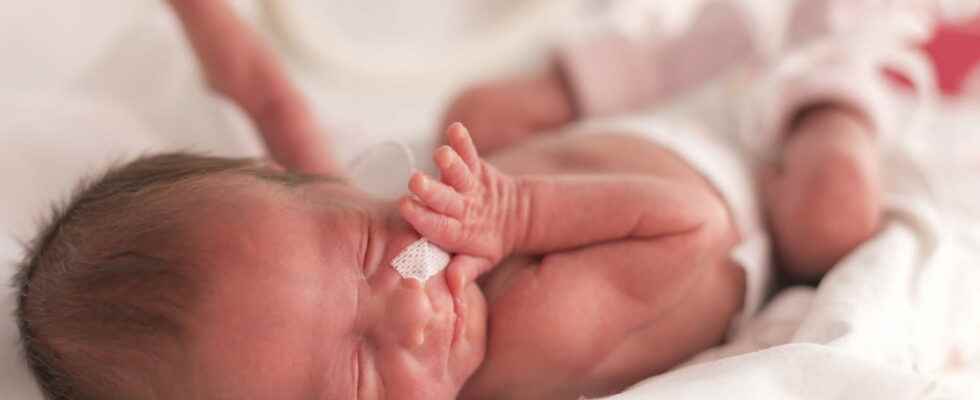Advice from Charlotte Bouvard, founder and director of the SOS Préma association to help future and young parents who welcome a premature baby.
When do we speak of prematurity?
In France, 60,000 babies are born prematurely every year, which corresponds on average to 8% of births. We are talking about prematurity when the birth occurs before 37 weeks of amenorrhea, i.e. 35 weeks of pregnancy. “Within this global prematurity, it is necessary to distinguish a average prematurity (from 33 SA to 36 SA+ 6 days), great prematurity (28 to 32 WA + 6 days) and a very prematurity (before 28 SA)“, specifies the association SOS Prema on its website. Most of the time, the premature deliveries are not planned, and parents can quickly feel overwhelmed. Between worry and guilt, how to overcome this ordeal and welcome your child in the best conditions? Charlotte Bouvard, founder of the SOS Préma associationgives us his advice*.
In some cases, the premature birth is planned and the mother is referred to an appropriate maternity unit. We then speak of “threat of premature birth“. Charlotte Bouvard then advises couples to seek information from other parents, to take advice from a health professional, or even to visit a newborné to better prepare for the arrival of the baby. Thus, parents can become aware of the medicalized universe (sensors, monitoring, probes, resuscitation, etc.) while exchanging with the medical team who can reassure them about the care of the infant.
The presence of parents, essential
As far as possible, “parents mustester most often alongside their newbornbecause their presence is a real medicine for the child“, insists Charlotte Bouvard. Practice skin to skin, breastfeed, or bring a mattress to sleep with your baby are all positive things for the child.
How not to blame?
“It is a complicated passage in life sincewe give life, with a notion of death“explains the director of the association, and the psychological repercussions are often present in mothers, most of whom have a feeling of guilt. It is therefore essential to talk about it. “Above all, we must not silence the story or say to ourselves “it’s my fault”, but on the contrary, put words on his feelings“, she adds.”This premature birth will provoke contradictory emotions in the parents: the joy of being parents coexists with anxiety regarding the health of their child, guilt tarnishes the happiness of being a mother. There are sweet moments and periods of doubt, frustration, anger“, explains Myriam Dannay, psychologist of the association.
How to limit the impact on the couple?
“Parents experience the same things, but at different times, and sometimes a gap widens“, warns Charlotte Bouvard. Indeed, this trauma is put aside at the birth of the child given the urgency of the situation, and will be felt in a second time, upon arrival home. Also, each person reacts differently. “Women feel like they’re not up to it and it’s not uncommon for them to have postpartum depression.“, she specifies. Couples must therefore listen to each other and discuss their feelings in order to move forward together for the good of their child.
Trust the medical team
“Each child is unique. The main thing is to fully trust the medical team which has the same objective as that of the parents: the well-being and health of the baby“, recalls the director of the association, who herself gave birth to a premature baby, Maxence, now 14 years old and in good health.
How to prepare for discharge from hospital?
You apprehend arrival home, where you will now be alone to take care of your baby. But keep in mind that “the doctors take no risks and if they think your child can be discharged from the hospital, it is because they know that he will be safe”, reassures the association. Before leaving the hospital, try to rest as much as possible so that you are in good shape for the future. Do not hesitate to ask for help from those around you and, conversely, to also tell them that you prefer not to have visitors.
What equipment should be provided for a premature baby?
- Having a car seat reducer is essential for any trip by car.
- In bed, the child must also be properly supported. Of course, avoid stuffed animals.
- Also think about clothes adapted to his small size.
- Finally, your child’s room must be aired regularly and at the right temperature.
- In addition, if your baby was born before 32 weeks of amenorrhea and especially if he had respiratory problems during the neonatal period, it is recommended to avoid the collective crèche, because of the risk of virus contamination.
Diapers for premature babies
Remember that some manufacturers are beginning to offer products suitable for premature babies. Pampers has notably designed a new range of nappies (the smallest in the world) to meet the specific needs of premature newborns. called Pampers Preemie Protection, these mini format nappies are available in three sizes P1 (<1.8 kg), P2 (<1 kg) and P3 (<500g) and distributed in certain maternities. "This new layer rises less high and thus allows the umbilical cord to be more open and to remain dry, limiting the risk of infection., had testified the neonatal resuscitation teams of the Rennes University Hospital, during the launch in November 2017. These diapers contain in particular: an absorbent mattress at the front and at the back to be able to change the baby without having to change its position; a mattress that is narrower in the crotch to promote proper positioning of the hips and legs; soft barriers and soft materials, plus detachable ties that can be completely removed and placed anywhere, to accommodate babies’ unique needs.
